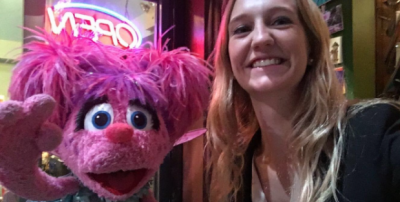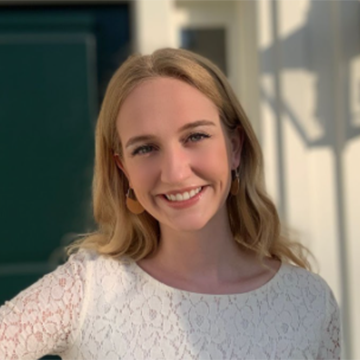
Career Profile
Catherine Bond:
Data Science as a Passport to Learning
Persevere through the hard stuff if you enjoy it, and don't assume that if something is hard and doesn’t come naturally to you that you shouldn't pursue it.
In high school, Catherine Bond found her computer science classes challenging. While that experience turned her off from the programming space initially, she says, it did not manage to fully turn her off from data science. Data science, Bond says, is a diverse field that is much more than how it might be traditionally viewed. “I think there is the stereotype that you're alone in a basement in the dark wearing a hoodie, not talking to anyone,” she says. “But the work that I do in data science is very person centric and creative, requiring a lot of empathy.” Bond now works on the operations strategic planning, risk, & analytics team at Amgen in the Emerging Talent Rotational Program. Even though she switches jobs every 8 months for the first 2 years as part of the rotational program, her positions share a common thread of data analytics and data science.
As part of our ongoing series of stories about the growing opportunities for data science in biotechnology, we spoke with Bond about her current work, her early start in science, and what it’s been like starting a job remotely during the pandemic.
Can you tell us a little bit about the roles you have had in the rotational program?
In my first role, I was working to support process engineers on the manufacturing floor, where our medicines are actually made. I was building different digital tools to allow those engineers to quickly access important data about materials that are involved in the manufacturing process. After that, I rotated into my current team, doing business process automation work and work on financial insights. The data I’m working with is very different from manufacturing and it’s in support of different decisions, but I’m flexing the same data analytics muscles. In my next rotation, I’ll continue my data analytics journey on an operations finance team.
So, in these roles, are you programming?
I am, but I'm more on the data analytics and visualization side. That means learning about the different source systems that we have at Amgen, and learning how to grab the data out of them, which involves a language called SQL (Structured Query Language). And then the biggest part of my role as a data analyst is actually figuring out how to visualize that data, which means tasks like building charts and identifying the best way to present the data on a page, so that whoever is looking at it can really quickly grab insights and not have to waste time digging through all the data.
What do you like about this work?
I think a lot of people think about data science as being very technical, and it is, but it’s also very creative, because you're designing and creating dashboards, which are basically webpages for people to visit and really quickly gain insights.
The other part of it is that the data you're working with can teach you so much about the business. I have learned so much about supply chain, finance, and manufacturing just by touching the data from these spaces. I think of data science as a passport to different functions and different industries. It really is all encompassing and lets you dabble in different, diverse spaces.
What got you into science in the first place?
When I started as an undergraduate at Harvard. I knew I wanted to pursue STEM because of the incredible impact of science and technology that I had witnessed growing up. I was taking all the prerequisites for a degree in physics, but I honestly wasn't enjoying them as much as I was expecting to. And the sidebar to that is that I've always been really interested in social impact work and volunteerism. So, the first internship that I had in college was at Sesame Workshop, the nonprofit that runs Sesame Street. While working in project management at that nonprofit, I got exposed to the character of Julia, who is a young girl with autism. In working with that character and engaging with the community of fans, I became interested in the autism space and I discovered the intersection of neuroscience and social impact.

After that internship, when I got back to school, I changed my major to computational neuroscience, and I started working at Boston Children's Hospital in its lab of cognitive neuroscience. We were working on designing an algorithm to predict early autism based on brain scans, and it was so perfect because it was a research project that merged data science with interacting with patients.
That really exposed me to the personal element of data science and showed me that it doesn't just have to be this single-faceted thing.
How did you ultimately end up in biotechnology?
Through my work at Boston Children's Hospital interacting with patients, I realized that I wanted to be somewhere where I was improving the lives of people, so biotech made a lot of sense. I applied to tons of summer internships, and I spent a summer working at Amgen in operations. I loved it; the work was really challenging, and I knew I wanted to come back to Amgen after graduation. The rotational program was a really good fit for me because it allowed me to explore various roles and teams.
You started working during the pandemic. What has that been like? Are you on video calls all day?
Really weird. I started work remotely, and I've never been into the office as a full-time employee, which is difficult as someone who is energized by people. It’s also challenging to make yourself known in a virtual environment. It still has its advantages—I think there's this decreased barrier to getting access to people when you work remotely because we're all sitting in front of our screens in the same way. So in a way, I think I've met a lot of people at different sites in different countries in totally different teams that I never would have met if we just worked in person
In terms of video calls, I would say 40 to 50% of my day is usually in meetings, which is great, because I love people. I spend the rest of my day working on whatever project I have ongoing, which could be building a new digital tool or a database.
In addition to your day-to-day work, you also lead up the ABE Volunteer Program at Thousand Oaks. What is that work like?
As the site lead for the ABE Volunteer Program, I get to publicize how awesome the opportunity is to staff members. I'm especially passionate about getting staff members involved who are earlier in their career, and with diverse backgrounds into classrooms, because I think it's really valuable. I also lead a group called the Amgen Social Impact Collective, which is a group of cross-functional cross-tenured staff at the company who all just volunteer because they're passionate about the social impact space to promote social impact within the company.
What advice do you have for ABE students?
Pay a lot of attention to the things that naturally excite you, and don't be afraid to explore a lot. In high school, it seemed to me like there was really only one path to adhere to, to get to where I wanted. And it wasn't until college that I was encouraged to explore, and I realized I had all these other interests.
Specific to data science, I think my advice would be don't be discouraged by difficult classes. In high school and in college, data science were not my best classes. I remember spending like 14 hours on problem sets that other people could do like a breeze. I really enjoyed the work, but I just didn't find myself to be very naturally good at it. The real world is so different from school and working now a year into my career, I know now that I love data science, and I am really good at it in the workplace. So, persevere through the hard stuff if you enjoy it, and don't assume that if something is hard and doesn’t come naturally to you that you shouldn't pursue it.
